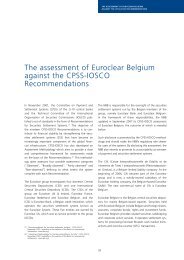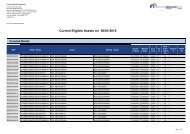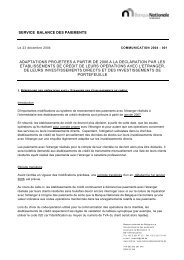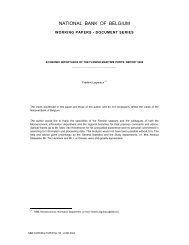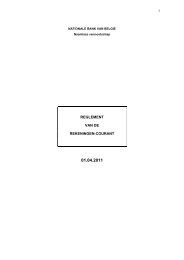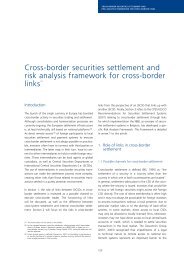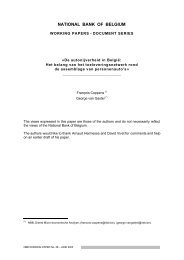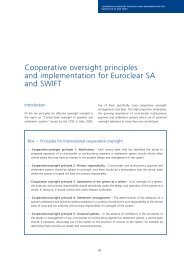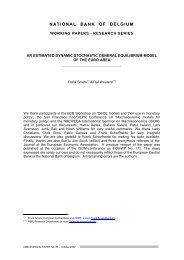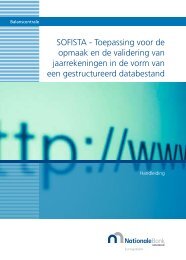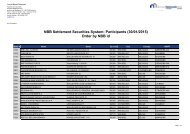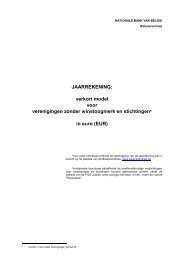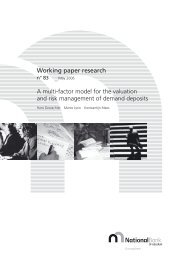Working Paper Research - Nationale Bank van België
Working Paper Research - Nationale Bank van België
Working Paper Research - Nationale Bank van België
Create successful ePaper yourself
Turn your PDF publications into a flip-book with our unique Google optimized e-Paper software.
country risk exposure, capital ratios, maturity transformation, and controlling the "entry" of newmarket participants. The paper was quite positive on the use of prudential measures, concludingthat they "could be a useful approach to ensuring that growth of international bank lending marketsis soundly based. They could further have some, albeit modest, constraining influence on thatgrowth".The <strong>Bank</strong> of England paper was a topic of intense discussion in the Lamfalussy Group. In the end,it was decided to consult the Committee on <strong>Bank</strong>ing Regulations and Supervisory Practices(chaired by P.W. Cooke of the <strong>Bank</strong> of England) about the technical feasibility of using some ofthese prudential measures 38 . So, a questionnaire concerning the feasibility of the use of specialbalance-sheet provisions for involuntarily rescheduled loans and the use of capital ratios was sentto the Cooke Committee.The Cooke Committee was not very much in favour of a "macro-prudential" approach 39 . In itsReport, it took as its starting point the view that "supervisors should not impose on the banks forwhich they are responsible any measures for which there are not sound prudential reasons" 40 . TheCooke Committee rejected the proposals of the Lamfalussy Group to use prudential measures inorder to constrain the growth of international bank lending, not only for technical reasons, but alsobecause of a lack of prudential justifications and even of a potential conflict betweenmacroeconomic and prudential aims. It observed that the two proposed prudential measures"would be technically difficult to implement at the national level and, on the basis of experience todate, both would be difficult to justify on prudential grounds. More importantly, both appear to poseproblems of conflict between macroeconomic and prudential aims 41 ; and neither appears likely toexercise much constraining influence on banks' international lending beyond what would beachieved by effective prudential controls on individual banks applied on a consolidated basis".In its final report, the Lamfalussy Group emphasised three elements: the need for effectivesupervision of the international banking system, the reduction of inequalities in competitiveconditions between domestic and international banking, and the monitoring of international bankingdevelopments 42 . In this respect, the Report pleaded for improvements in the timeliness and qualityof the statistics reported to the BIS, a typical Lamfalussy concern. On the basis of the different38 Chairman's progress report on the activities of the "<strong>Working</strong> Party on Possible Approaches to Constrainingthe Growth of International <strong>Bank</strong> Lending", 28 November 1979, BISA, 7.18(15), LAM25/F67.39 Committee on <strong>Bank</strong>ing Regulations and Supervisory Practices, Report on the use of certain prudentialmeasures to constrain the growth of banks' international lending, February 1980, BISA, 7.18(15),LAM25/F67.40 However, it continued: "At the same time, it is recognised that there can be concerns of a macro-prudentialnature, which may not readily be perceived at the level of the individual bank, to which the supervisorshould have regard. In addressing itself to the questions posed by the Lamfalussy <strong>Working</strong> Party, theCommittee has not attempted to reach a collective judgment on whether or not such concerns arise inpresent circumstances".41 The "problems of conflict" were not specified in the Cooke Committee Report.42 It also mentioned that "a number of members of the <strong>Working</strong> Party" were in favour of prudential measuresto constrain international bank lending.15



